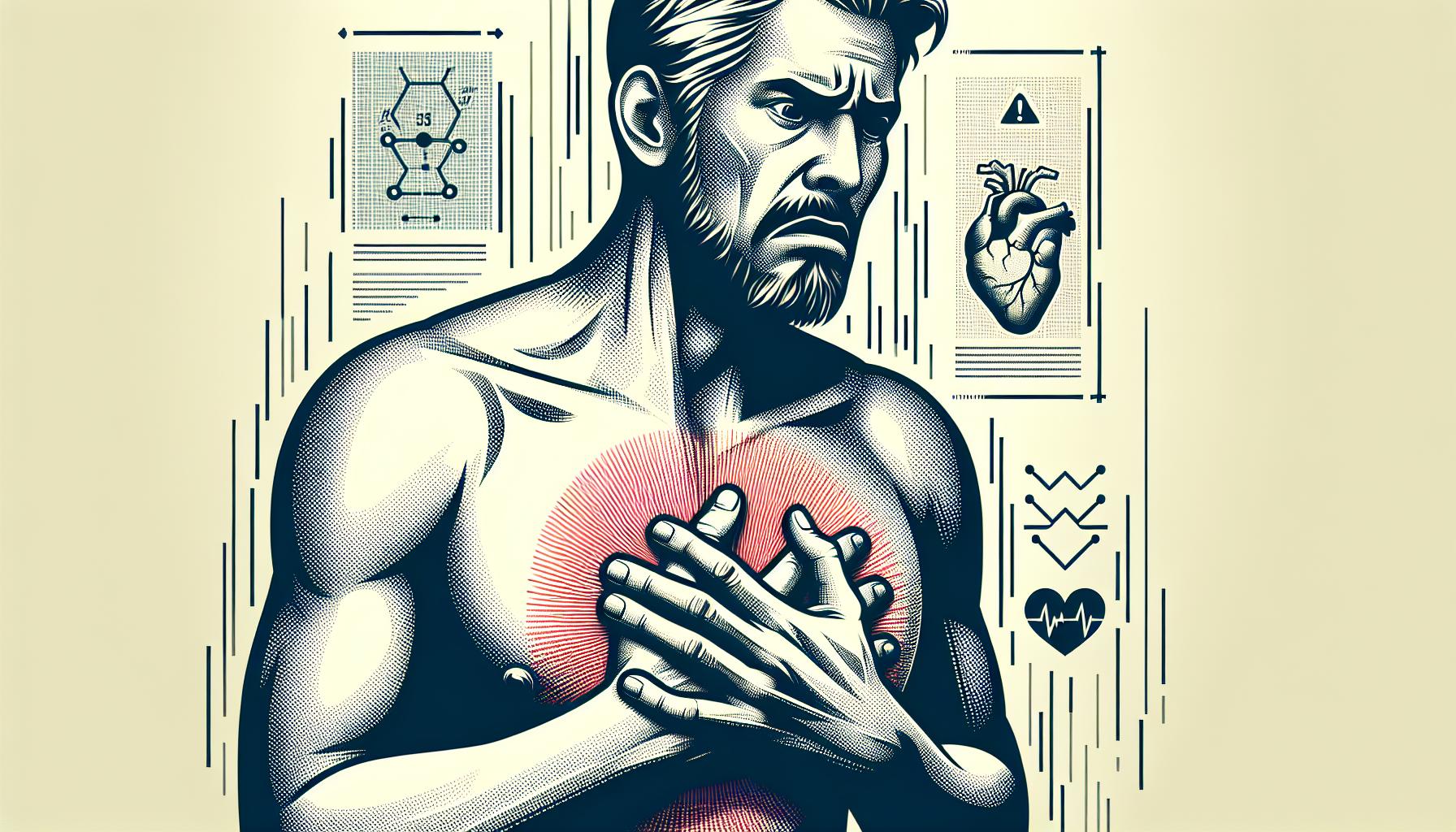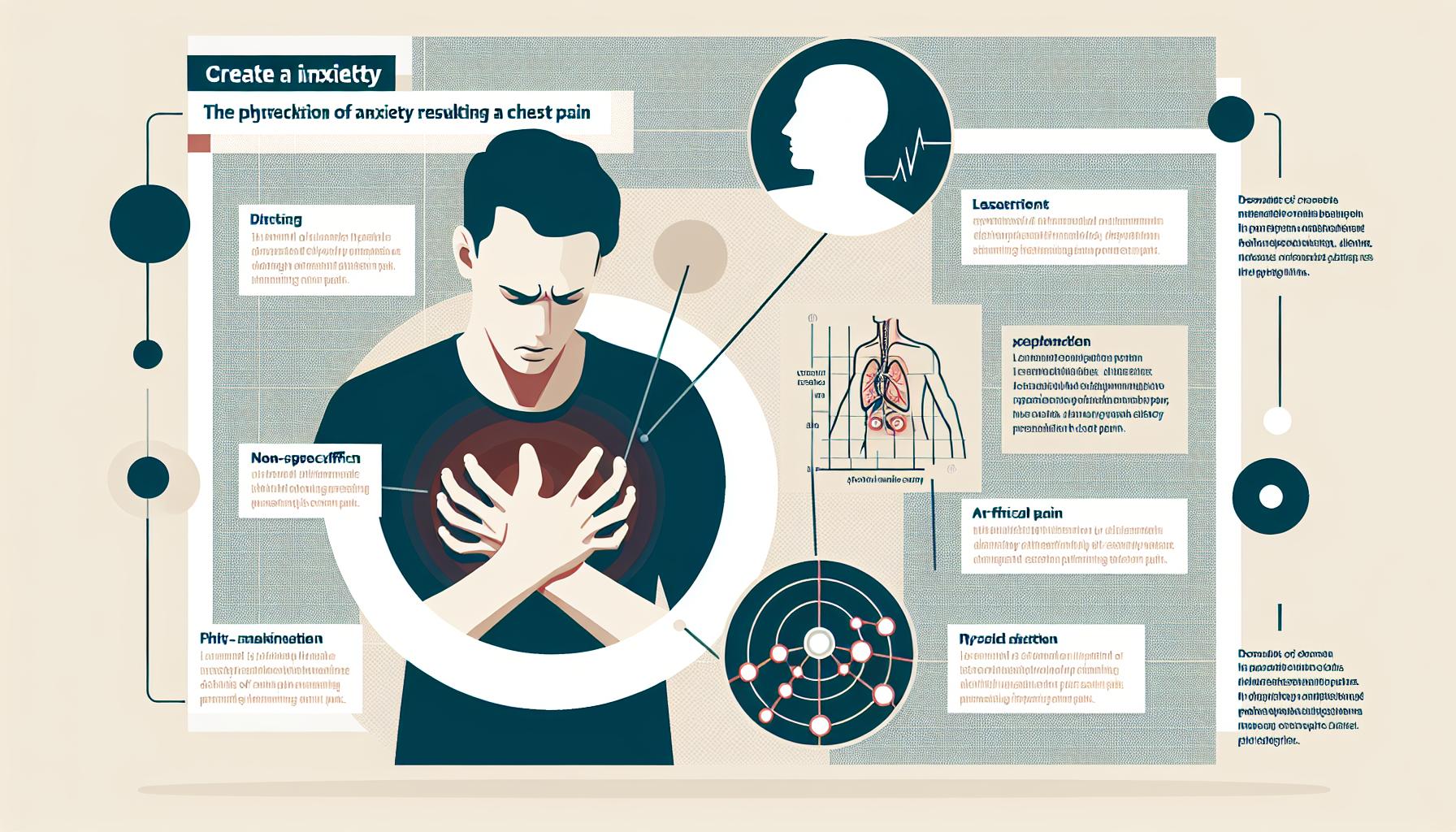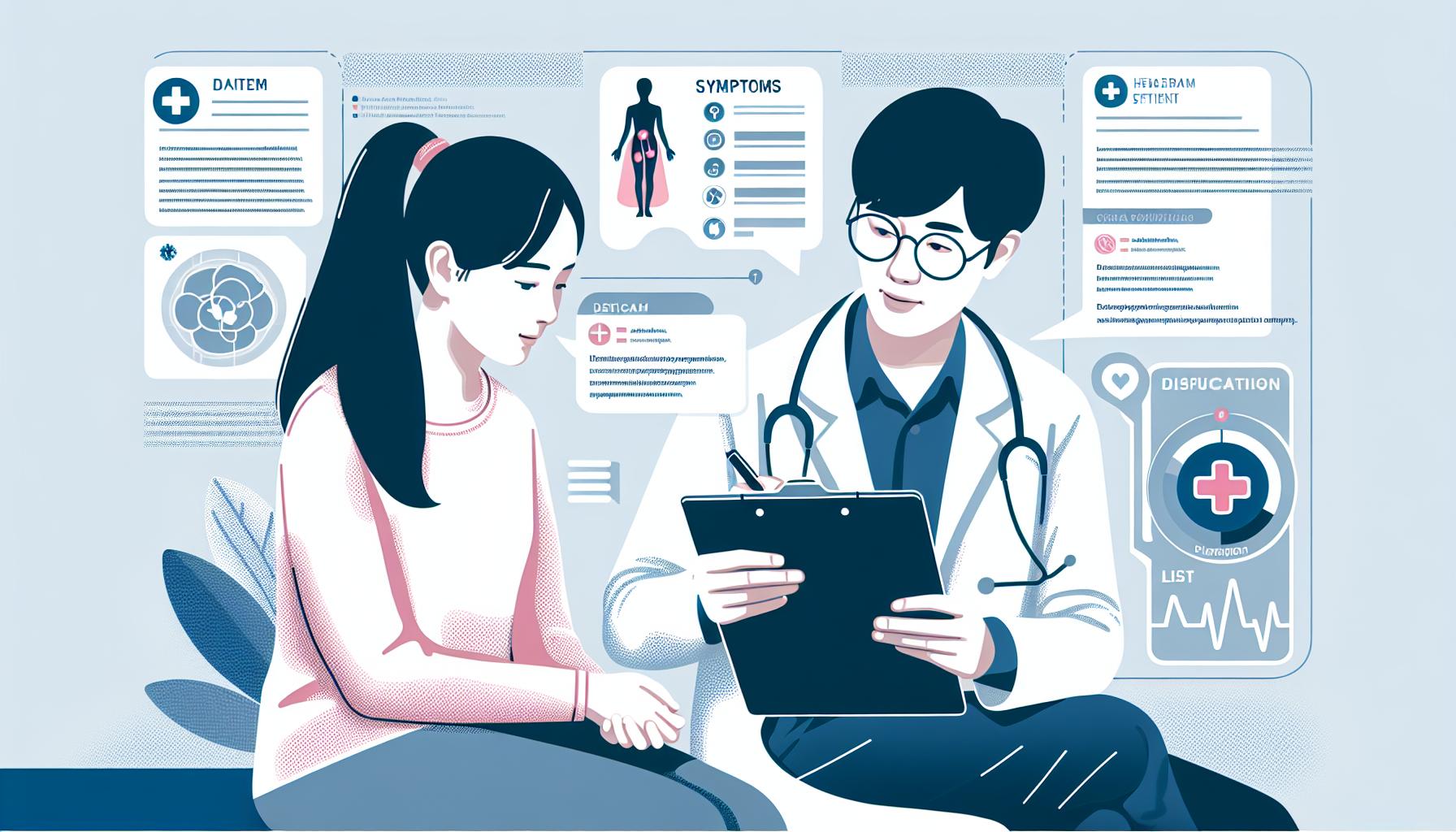Ever found yourself wondering, “Is chest pain a symptom of anxiety?” You’re not alone. It’s a question many people ask, especially those experiencing anxiety for the first time.
Anxiety can manifest in various ways, and sometimes, it’s physical. One of the common symptoms you might experience is chest pain. But how do you distinguish it from other health issues? Let’s delve into the topic.
This article aims to shed light on the connection between anxiety and chest pain. We’ll explore the reasons behind it and how to deal with it effectively. So, if you’ve been facing this issue, stay tuned. The knowledge you gain could be a game-changer.
Key Takeaways
- Anxiety is a prevalent condition, affecting around 18.1% of US adults annually, manifesting in various ways which include physical symptoms like chest pain.
- Anxiety-related chest pain is often a result of stress-induced ‘fight or flight’ response, causing a surge of adrenaline that increases heart rate and blood pressure.
- Notably, research suggests a significant overlap in people experiencing non-cardiac chest pain (which can be similar to heart attack symptoms) and anxiety disorders.
- It’s crucial to differentiate anxiety-induced chest pain from cardiac chest pain. Anxiety-related pain is typically sharp, localized, and related to stress or body movement, while cardiac pain often feels like pressure across the chest and may spread to other body parts.
- Management of this condition requires a mix of professional help, self-care practices, and lifestyle adjustments. This includes cognitive behavioral therapy, medication, regular exercise, diet alteration, and stress management techniques.
- Persisting symptoms of anxiety-related chest pain should prompt professional consultation. Treatment options often involve psychotherapy and medications, and its efficacy varies among individuals. Patient cooperation is crucial when designing a personalized and most effective treatment regimen.
Understanding Anxiety and its Physical Symptoms

Imagine you’re in a scary or stressful situation. Now think about how your body reacts. Your heart races, palms sweat, and your breathing becomes heavy, right? Well, that’s your body’s response to stress, also known as the “fight or flight” response. That fight or flight response can be quite powerful, especially when it’s triggered by anxiety.
Let’s dive a bit deeper into understanding anxiety. Anxiety is more than just feeling stressed or worried. It’s actually a serious condition that affects your daily life. In fact, according to the Anxiety and Depression Association of America, about 40 million adults in the U.S. – or 18.1% of the population – suffer from anxiety disorders every year.
Anxiety disorders can cause a variety of physical symptoms – among the most common is chest pain. If you’re suffering from an anxiety disorder, chest pain can often feel similar to a heart attack. But don’t let this scare you even more. Instead, let’s arm you with information and ways to tell the difference.
Although the link between anxiety and chest pain isn’t fully understood, some studies suggest that anxiety might make the heart more susceptible to pain. One such study published in the Clinical Psychology Review found that patients with non-cardiac chest pain were significantly more likely to have an anxiety disorder than those with cardiac chest pain.
Let’s look at this in a more digestible format:
| Study | Patient group | Percentage with Anxiety Disorder |
|---|---|---|
| Clinical Psychology Review | Non-cardiac chest pain | Higher |
This data suggests that the connection between anxiety and chest pain isn’t something to be ignored. Being educated about anxiety and its symptoms is your first step toward managing it effectively.
Through this understanding, you’re now better equipped to recognize some of the physical symptoms of anxiety, including chest pain. And though we still have much to explore in the realm of anxiety and its effects on the body, we are constantly learning more. As we progress in this exploration, there will be new insights and developments to share in the future. Through knowledge, you have the power to mitigate those anxious feelings and work towards leading a less stressed, more fulfilling life.
The Link Between Anxiety and Chest Pain

Did you know? Anxiety disorders are the most common mental illness in the U.S. affecting over 40 million adults every year.
So you’re now aware that anxiety can manifest in physical forms like chest pain. The “fight or flight” response your body triggers in stressful situations involves a surge of adrenaline causing your heart to beat faster. Stress-related adrenaline bursts are a significant contributing factor to non-cardiac chest pain.
Anxiety activates your autonomic nervous system, which controls unconscious body functions such as heart rate and blood pressure. In response to high-stress levels, your heart rate increases, and blood pressure rises, often resulting in discomfort or sharp chest pain. It’s crucial to understand the connection here, as it’ll empower you to manage anxiety symptoms effectively.
A plethora of research supports anxiety’s connection with non-cardiac chest pain. One study found that of those experiencing non-cardiac chest pain, a significant percentage were also diagnosed with an anxiety disorder.
Further medical research continues in this field, aiming to provide a clearer understanding of how anxiety directly impacts our physical health. While this paints a somewhat gloomy picture, the bright side is that by understanding anxiety, its triggers, and its physical symptoms, you’re taking significant steps to better manage your conditions and progress towards a less stressful life.
As you delve deeper into understanding anxiety, it’s apparent that mental health care is an essential aspect of overall wellness. With an open mind, holistic view, and willingness to seek help when needed, the journey towards managing your anxiety, consequently reducing your chest pain, becomes achievable.
Even without a final word, the conversation about anxiety disorders and their physical manifestations like chest pain is an ongoing one. The field of medical research is deep-diving into this correlation, promising newer insights and advancements in the future.
As this exploration continues, remember, acknowledging the symptoms of your anxiety is the first step to managing it. And you, you’re already on this path.
Differentiating Anxiety-Related Chest Pain from Cardiac Issues
Understanding the distinct characteristics of anxiety-related chest pain versus cardiac issues is an essential step in assuring that you adequately manage your health. It’s often tricky because the symptoms of anxiety and heart issues can overlap significantly.
Anxiety-related chest pain typically manifests differently compared to cardiac pain. Generally, it’s described as sharp and stabbing, confined to a small area, and often increases with palpation or body movement. It can occur unpredictably and may even worsen when you experience high levels of stress or during panic attacks.
On the other hand, cardiac chest pain – or angina – tends to be more consistent. It usually presents as a pressure or squeezing sensation across your entire chest and may spread to your jaw, neck, arms, and back. This type of discomfort commonly develops during physical activity or emotional stress and often subsides with rest or medication.
Besides these differences in symptoms, there are also several diagnostic tools to distinguish anxiety chest pain from a cardiac issue. Doctors may recommend electrocardiograms, exercise stress tests, cardiac catheterization, and other medical imaging. In contrast, diagnosing anxiety involves more psychological evaluations like questionnaires, clinical interviews, and mental health assessments.
is important to note that anxiety disorders and heart conditions can coexist, making diagnosis and treatment more complex.
Being aware of these differences and understanding the unique nature of your symptoms can guide you towards proper medical attention. Never self-diagnose or ignore any chest pain, as it might be a sign of a serious condition that needs prompt medical care.
Whether your chest pain is due to anxiety, a heart condition, or another health issue, it’s essential to take it seriously. Know the signs and differences to take charge of your health.
Managing and Coping with Anxiety-Induced Chest Pain
Dealing with anxiety-induced chest pain requires a multifaceted approach that combines the benefits of professional help, self-care, and lifestyle modifications. It’s important to seek immediate medical attention if you’re experiencing severe or sudden chest pain. Never ignore or attempt to manage chest pain on your own without a proper medical diagnosis. Once you have been diagnosed with anxiety-related chest pain, the following strategies would be beneficial:
Professional Help
You should consult a healthcare provider experienced in managing anxiety disorders. Their input will be invaluable in designing a comprehensive, personalized treatment plan. Typical recommendations might include:
- Psychotherapy: Cognitive Behavioral Therapy (CBT) is one widely used approach. It helps identify and change thought patterns leading to anxiety, teaching you to respond to stress more effectively.
- Medication: Certain medications might be useful in managing symptoms, including beta-blockers and Selective Serotonin Reuptake Inhibitors (SSRIs). Always follow your healthcare provider’s advice when taking prescribed medication.
Self-Care Practices
Regular self-care practices can significantly improve your quality of life. Here are some self-care practices to consider:
- Engaging in physical activities like walking, running or yoga. Regular exercise has been proven to reduce anxiety symptoms.
- Following a balanced diet with plenty of fruits, vegetables, whole grains and lean proteins. Diet plays a crucial role in mental health.
- Prioritizing quality sleep. Lack of sleep has been linked to increased levels of anxiety.
- Practicing relaxation techniques such as deep breathing, meditation or mindfulness. These techniques can help to reduce chest pain by promoting relaxation and reducing stress levels.
Lifestyle Modifications
In addition to medical treatments and self-care, certain lifestyle changes can help manage anxiety-induced chest pain. Reducing caffeine intake, avoiding alcohol, quitting smoking, and learning stress management techniques all contribute to keeping anxieties at bay.
Remember, it’s vital to renew your prescription and stick with the prescribed treatment plan even after the chest pain subsides. Sudden discontinuation of medication or other treatments can lead to symptoms returning or even worsening! Having anxiety-induced chest pain can be a frightening experience, but with effective management, it is entirely possible to lead a regular, fulfilling life.
Seeking Professional Help for Persistent Symptoms

When facing persistent anxiety-related chest pain don’t neglect the symptoms or dismiss them as ‘just being anxious’. It’s crucial to seek professional help to manage this distressing symptom effectively.
Your first port of call should be your primary care doctor. They’ll perform an initial assessment to rule out heart-related issues. If cardiovascular problems aren’t the cause, your doctor may refer you to a mental health professional for further evaluation and treatment.
Psychotherapy and medication are often used in tandem to manage anxiety. Cognitive-behavioral therapy (CBT), one of the psychotherapy types, has proven its effectiveness in managing anxiety disorders. It provides strategies to recognize and change thought patterns leading to anxiety.
Your therapist might also introduce you to mindfulness and deep breathing techniques. Integrating these into your daily routine can be a helpful way to alleviate chest pain caused by anxiety.
Beyond one-on-one therapy sessions, consider joining a support group. You’re not alone in experiencing this. Connecting with others who understand your feelings of fear and anxiety can be a great comfort and an additional source of coping mechanisms.
Pharmacological interventions can also play a substantial role. As part of a comprehensive treatment plan, your doctor may prescribe selective serotonin reuptake inhibitors (SSRIs) or benzodiazepines to manage your anxiety levels.
Remember, it’s crucial to work closely with your healthcare provider to develop a treatment plan tailored to your unique needs.
No single treatment method suits everyone. A treatment approach that works best for you is determined by a host of factors: from your specific anxiety disorder, its severity, your overall health, to your personal preferences and lifestyle. You may need to try several approaches or combinations thereof before you hit on the most effective solution.
Thinking about professional help might be intimidating, but you’ve got a lot of options open to you. You’re taking a significant step toward a better, more controlled life by deciding to seek professional help for anxiety-induced chest pain. Remember, it’s all about progress, not perfection. This journey is yours, and every small step counts toward your wellbeing.
Conclusion
So, you’ve learned that chest pain can indeed be a symptom of anxiety. It’s crucial not to overlook this symptom and to seek professional help. Remember, your journey towards better health may involve trying out different strategies, from CBT and mindfulness to medication and support groups. The key is to find what works best for you. Don’t expect perfection but aim for progress. With a tailored treatment plan and collaborative healthcare, you can effectively manage anxiety-induced chest pain. Your well-being is within reach. Don’t hesitate to ask for help when you need it. Your health is worth it.
1. Why is it important to seek professional help for anxiety-related chest pain?
It’s important because these symptoms might be more than just anxiety – it may also indicate an underlying health condition. A professional can conduct a thorough assessment and guide you towards appropriate treatment.
2. What are the first steps towards addressing anxiety-related chest pain?
The first step is to consult with a primary care doctor. They can conduct an initial assessment and, if necessary, refer you to a mental health professional for further evaluation and treatment.
3. What strategies are effective in managing anxiety?
Effective strategies include cognitive-behavioral therapy (CBT), mindfulness, medication, joining support groups, and exploring pharmacological interventions like SSRIs or benzodiazepines.
4. How are treatment plans for managing anxiety-related chest pain designed?
Treatment plans are tailored according to individual needs in collaboration with healthcare providers. It might require trying various methods to find the most effective approach.
5. How important is progress in the journey towards managing anxiety-induced chest pain?
Progress is crucial in the journey towards improved well-being. Rather than aiming for perfection, the focus should be on making consistent strides towards managing anxiety symptoms.
The post Understanding Anxiety-Induced Chest Pain: Symptoms, Management, and Treatment appeared first on After Anxiety.
Understanding Anxiety-Induced Chest Pain: Symptoms, Management, and Treatment published first on https://after-anxiety.com/

